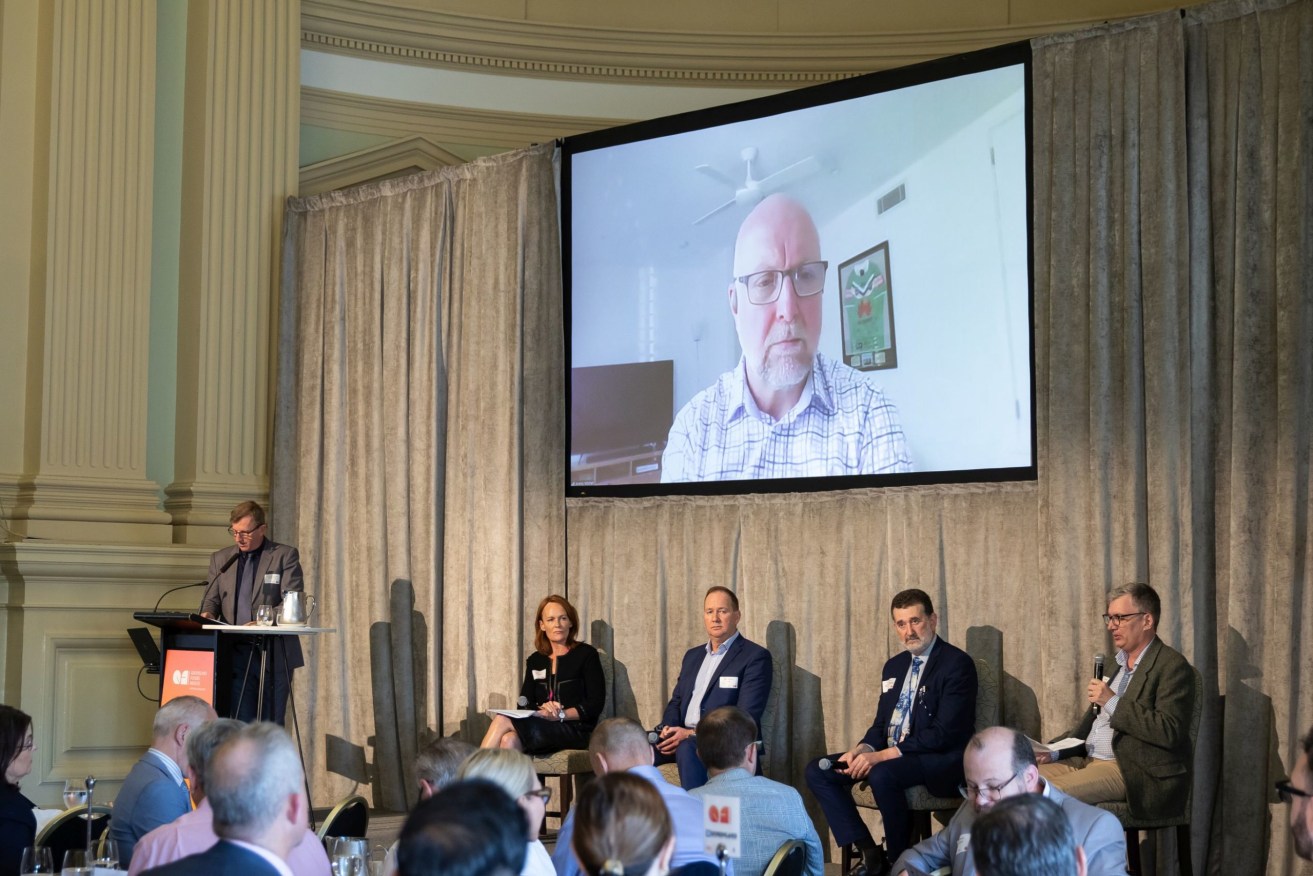Control shift: How COVID will push our digital buttons
Public health controls during the pandemic will accelerate Queensland’s digital transformation, a business function in Brisbane has been told.


The Queensland Futures Institute panel in action, from left: Karina Collins, Gaven Nicholls, Andrew Spina, Duncan Unwin and Jeremy Mitchell via video.
Guests of the Queensland Futures Institute breakfast also heard that the Brisbane Olympics in 2032 will be the event that businesses, organisations and government will use to set timeframes for new digital developments.
But according to one of the panel speakers, KPMG’s Karina Collins, transforming Queensland’s digital landscape need not involve massive disruption or upheaval.
“The question to ask is how do we use digital to unlock opportunities that fit within existing business models or address new challenges within their operations,” she said.
“We’re looking for an acceleration of the current data ecosystem that puts people and the customer at the centre of this evolution.”
Just how adaptive Queenslanders will be to new digital processes, has already been partly explained by recent health controls deployed to contain the spread of COVID-19.
The Queensland Government’s acting chief customer and digital officer, Andrew Spina, said the best example was the government’s COVID check-in app, which has registered some 600 million interactions since it was launched.
“That technology alone has brought people from all walks of life into contact with the power of digital technology that’s interactive, immediately responsive and accessible on a mass scale,” he said.
As explained by Huawei corporate affairs officer Jeremy Mitchell, who joined the discussion at Brisbane’s Customs House via video from locked-out Sydney, the experience of working from home and staying connected to people and services through technology – virtually by necessity – means more people are open to the possibilities of where digital transformation can take them in the future.
And they are ready to embrace the change. Although Mitchell believes that Queensland’s digital highway is moving at two speeds – faster in the city, slower in the bush.
“Rural and regional Queensland, indeed even some parts of Brisbane, still have massive connectivity issues,” he said.
“We would say they are missing out on world class broadband.”
Gaven Nicholls, general manager Queensland Government Telstra Enterprise, said the working from home ‘phenomenon’ would not die with the receding threat of COVID-19 in coming years.
Instead, it was here to stay, presenting challenges for business on how this will be addressed – either accommodated begrudgingly or embraced with enthusiasm to realise new opportunities.
“Early indications are that businesses want to pivot, they want to learn from the pandemic experience and be open to approaching the new digital world in different ways,” he said.
“There have been a lot of advantages working from home – some challenges too – but it’s a trend that will continue and it’s not going away anytime soon.”
Sectors that will be fundamentally altered from the pandemic in how they deliver services in the future, will be health and education, according to Spina.
Social distancing, border restrictions and intermittent localised lockdowns have forced both sectors to deliver more medical consultations and lessons and lectures remotely, in what could prove to also be a more cost-effective and lower-carbon emitting model in the future, rather than having large numbers of people travelling to physically congregate in centralised locations like hospitals and lecture theatres.
It also has the potential to bridge the rural-city divide, Spina said.
“It means that the health and learning sectors are more mobile than they ever have been – and they’re unlikely to ever be the same again,” he said.
Spina’s assessment reflected some of the observations offered by fellow panellist Duncan Unwin, a private consultant, who said digital technology will grow in alignment with the new imperatives driving cuts to carbon emissions.
“Above everything else, sustainability is now core business,” he said.
- We report regularly on matters relevant to QFI members. Stay up to date and Click here to Subscribe to InQueensland’s Daily eNewsletter








